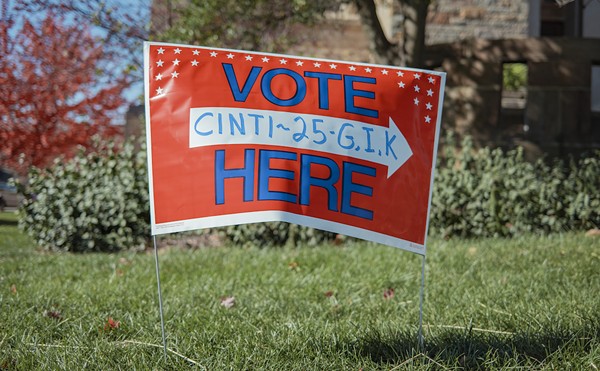I walked across Elm towards the union office of Local 48 on Eighth Street. I'd gotten tired of waiting in the reception area of CityBeat for an appointment I'd made. I was antsy and thought maybe I'd stretch out and catch someone in the union office.
The issues we were dealing with in Local 48 were big and were becoming more costly by the day. The major issue was a split that happened between white and black firefighters in the union. It happened at the same time the riots began in Cincinnati, and the split was all about race. It was about minority inclusion. Emotions were running high on all sides.
I had signed up as chair of the Human Relations Committee to try and heal the rift. Hopefully, we would be able to re-sign the black firefighters that walked out.
It was getting old and tiresome. There were many times I found myself in meetings arguing out points for both sides. I felt like I was an enemy to many and a friend to few. It wasn't easy.
Today, though, I didn't want to argue or even discuss politics. I just wanted to grab some taffy in the front closet and make some small talk with whoever happened to be in the office.
Cars with red Maltese cross stickers were parked on the street in front of the union office. That's always a good sign because it means the door is going to be open and a fellow member of Local 48 will be at the front desk.
I climbed down the stairs that drop below the sidewalk. The door to the office was open. I walked in. Several union brothers were standing around the front desk talking. Gleefully, I exclaimed to them all, "What's up, fellas?"
The room went quiet. For a few seconds I thought that I might have interrupted a behind-your-back conversation. A bald, stocky firefighter slowly turned his face my way. He had tears in his eyes.
"You didn't hear?"
"Hear what?" I replied.
"We had a line-of-duty death today."
I went uncomfortably numb. I had to sit down. Then I tried to get more information, anything, just by listening to them talk —Who? Where? What happened?
"It was Oscar Armstrong," the man said. "It happened about an hour, ago and we still don't know the whole story."
I didn't think I knew Oscar, or at least I didn't remember his name. I didn't know if he were black or white or if he were in the union or not. At that moment, at that point in time, to me it all really didn't matter.
"Where's he at?" I asked.
"U.C. Hospital," the bald firefighter replied.
I suddenly felt the need to go to there. I just knew there would be many firefighters there in mourning. I wanted to mourn with them. I walked back out the office door, leaving them with a sentiment of love and without grabbing any taffy.
At the emergency room entrance at U.C. Hospital, a young, skinny cop had to come and open the doors for me. He knew why I was there.
I thought Cincinnati firefighters would be everywhere in the hospital. I didn't see one.
"Where is everybody?" I asked.
The cop pointed his bony finger down a long hall. In a light Kentucky accent, he told me that they were all in a back room.
"All you have to do is go to end of the hall, make a right, and they should all be in the first door on the left," he said.
When I arrived, the door was open. I walked in, quickly thinking it must be the wrong room. Standing there was only a doctor wearing a white smock, but firefighters in blue weren't anywhere to be seen.
"Can I help you?" the doctor asked me, pushing his glasses further up his thin nose.
"Yeah," I said. "I'm a Cincinnati firefighter and I'm..."
"Oh, you're here to view the body."
"Whaaa? Huh? I just want to know where everyone is."
"I don't know where they went," the doctor said, looking out at the hallway. "They were all just here." He then turned back to me.
"Do you wish to view the body or not?"
I didn't know if I wanted to. It wasn't what I came to do. I didn't know if it was even the right thing to do. But I felt I needed to know who he was. Maybe, if I viewed him, I would know his face, and so I agreed.
The doctor led me to a smaller room. He opened the door. The smell of on-the-job smoke I've smelled a hundred times before greeted us. Within the center of the room, covered by a white sheet from head to toe was the dead body of my brother, Oscar Armstrong, sitting upright on a hospital bed.
The doctor walked over to Oscar and began to lower the white shroud from his head. The shroud then dropped to Oscar's chest, uncovering a badly burnt face.
My hands swiftly shot up, covering my eyes. My soul moaned out loud. So did my voice, and my heart ached, with them both crying out, "No more hard times in Cincinnati. We've had enough."
Then my hands slid slowly down my cheeks, dragging with them a full year of pain and tears. I again looked at Oscar. His eyes were slightly ajar but they were open enough that I could see them both. And into his eyes I peered way past any bad thing ever done and I saw every firefighter in the CFD — both sides seemed to have their fill.
The doctor walked out of the room, leaving us momentarily alone. And into eyes, deep in them, through my tears, I said, "We'll find a way. This is not to be in vain. We hope the same."





